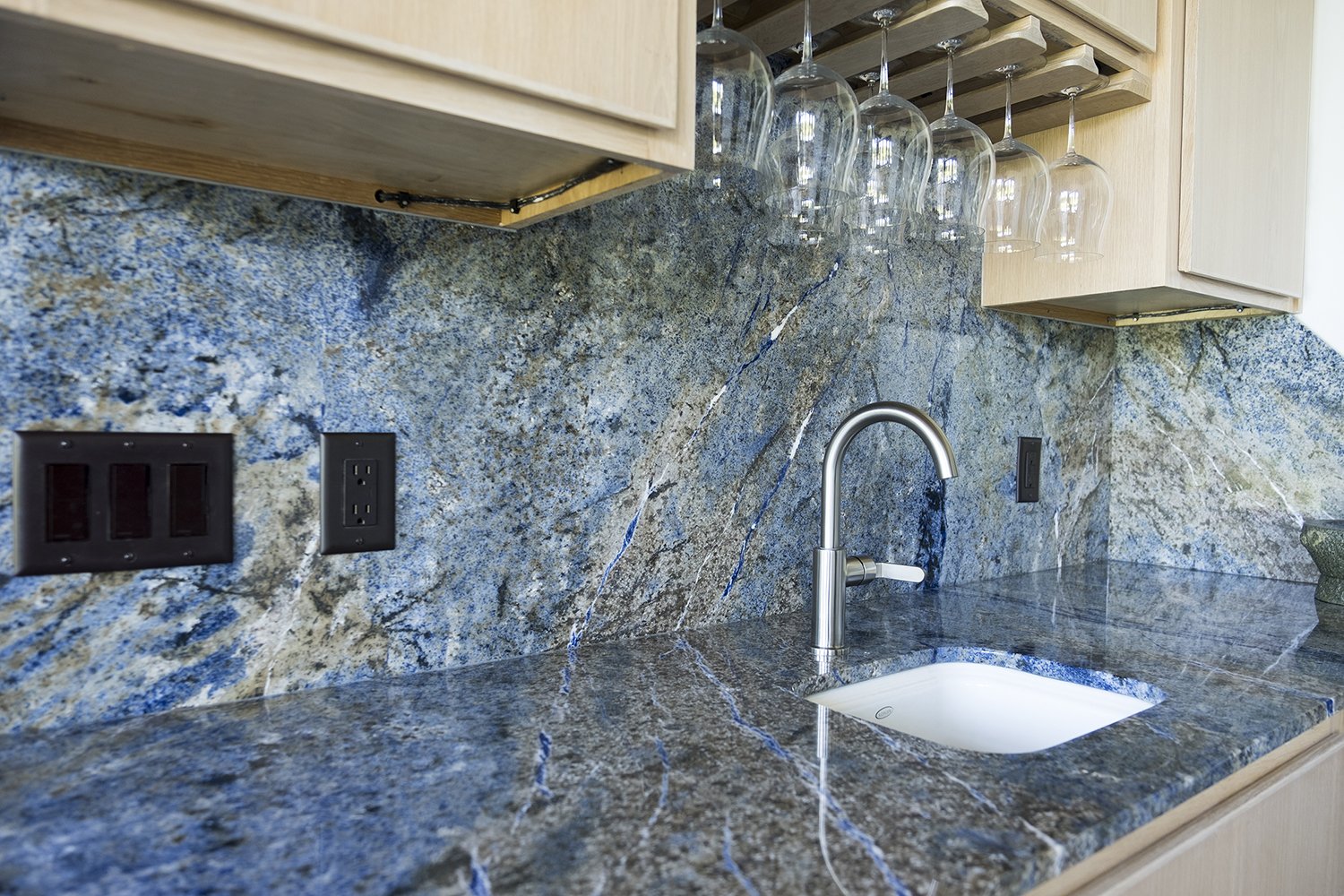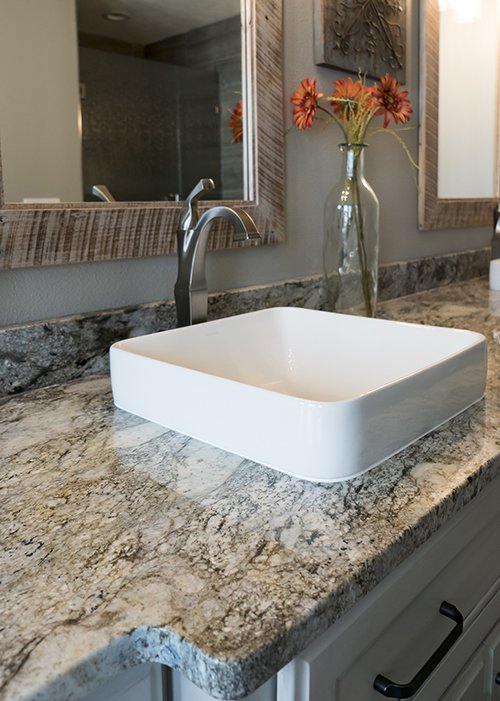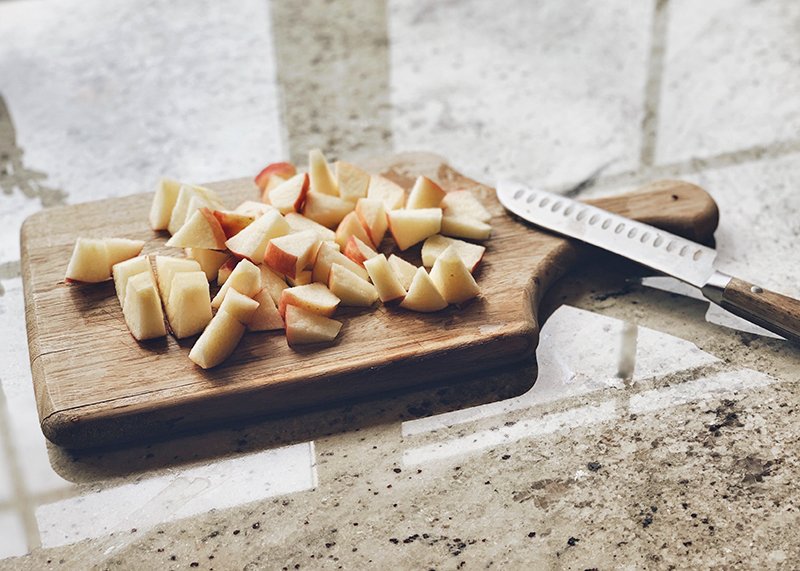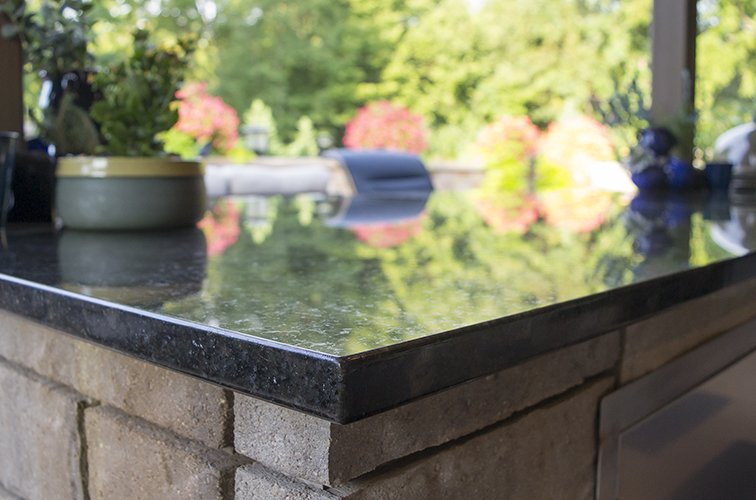About Granite Countertops in Missouri and Northern Arkansas
Are granite countertops worth the price? If you are buying or remodeling, you may be wondering whether granite is right for your kitchen, bathroom, or business. WilgusIQ in Springfield, Missouri, has been creating quality granite countertops for more than 25 years and can give you reliable answers to the following questions:
Granite countertops can be a good choice for businesses, like these installed by WilgusIQ for The Cliffs at Long Creek.
What Is Granite?
Granite is natural stone that forms when magma within the earth cools and solidifies. When magma breaks through the earth’s surface, we know it as lava. So, yes, in a way your granite countertops are lava! Click on the accompanying video to see just how hot it gets in the earth’s granite factory.
Granite is composed of primarily two minerals, quartz and feldspar. In fact, to be classified as granite by a geologist, a rock must be 20% quartz. By that definition, not every slab sold by quarries as granite is actually granite. Is that a bad thing?
No. When you buy granite from a reputable company, it is guaranteed to have all the properties of granite: the same durability, scratch, stain and heat resistance and the rest. It is exactly what you have in mind when you set out to buy granite, even if a geologist would call it anorthosite or schist.
By welcoming different members of the igneous and metamorphic rock families under the granite umbrella, the stone industry is able to offer the consumer a much greater variety of color and design. Pure quartz and feldspar are light-colored or translucent, but related minerals give us the rich hues of blue, green, or even pure black.
Blue Bahia granite bar in Springfield, MO, by WilgusIQ.
Does Granite Make a Good Countertop?
Granite countertops have been popular for so long, many people wouldn’t even question their value. But it’s good to remember these three basic reasons why granite is an excellent countertop material.
First, granite is durable. When properly sealed and maintained, granite countertops should last the life of the house. Which brings us to the second reason granite makes a good countertop, return on investment. Granite will stand up to years of wear and tear and can boost a property’s value when it’s time to sell.
Desert Beach granite countertop with a smooth chiseled edge by WilgusIQ.
But the third reason is probably the most important — granite makes a beautiful countertop. It has the luster of natural stone and comes in an endless variety of unique color and design. Granite edges can be sculpted in all styles, from classic to modern, fancy to rustic. There’s no doubt, granite is one of your best choices for countertops.
Do Granite Countertops Need to Be Sealed?
To answer that question, consider for a moment why granite is sealed. Granite is a porous stone with tiny spaces through which liquids and bacteria can enter. The seal closes the pores and acts as a first line of defense, allowing you more time to clean the liquid or oil off the surface before it can be absorbed into the granite. That’s why WilgusIQ seals your granite at the time of installation and recommends that you reseal it regularly.
However, not all granite has the same level of porosity. It’s like the difference between your skin and a sponge: both are porous, but not to the same degree. Because some granite is less porous, it may not need to be resealed as often. At WilgusIQ, we can help you evaluate which slabs might have a greater or lesser need for sealing before you buy.
Granite is naturally porous.
How Often Do I Need to Reseal My Granite Countertops?
Granite is commonly sealed for protection against bacteria growth, water marks and staining. But trying to find out how often to reseal can be confusing. You may hear recommendations ranging from every three months to every five years or more. The truth is, there is no one-size-fits-all answer. How often a granite countertop needs resealing will depend on: 1) the porosity of the granite; 2) whether you choose a standard or long-lasting sealant, and; 3) whether the granite has been exposed to substances that wear away the protective seal. (For more information see our Top Tips article, “Do My Granite Countertops Need Resealing?”)
That means that if you are shopping for granite there are steps you can take to minimize the number of times your countertops will need resealing. First, choose a less-porous slab. Darker colors are denser and therefore less porous. Second, when it comes time to reseal, invest in a long-lasting sealant. And third, clean the countertops with mild soap and approved granite cleaners only. You may be amazed at how long your seal will last.
How Do I Know If My Granite Countertops Need Resealing?
The standard way to check if your granite countertops need resealing is by pouring a tablespoon of water on several places along the surface. If the water is absorbed quickly, the granite needs to be sealed. WilgusIQ offers professional granite sealing at an affordable price. For more information, contact us to talk to one of our countertop specialists.
Sealed granite countertops are a hygienic choice for both kitchens and baths.
GOLDEN DUNES GRANITE VANITIES BY WILGUSIQ
Will Granite Countertops Stain?
Granite is a porous stone and should be sealed to protect it, as detailed above. Soda, fruit juice, wine, coffee, tomato juice and sauce are acidic and capable of staining granite. WilgusIQ recommends the following basic precautions: 1) clean up spills right away; 2) use coasters; and, 3) if oil containers or bath and toiletry products are in constant contact with granite surfaces, check them for leaks.
Will I Need New Cabinets for Granite Countertops?
Heavy granite countertops require well-built cabinets. If your cabinets were built for laminate or other lighter-weight surfaces, WilgusIQ recommends you have them evaluated to see if they are sturdy enough for granite or other stone countertops. For more information, see our Top Tips article, “Quality Countertops Need Quality Cabinets,” and accompanying video.
Will Knives Scratch a Granite Countertop?
While it’s difficult to scratch the stone itself, a sharp knife can harm the granite’s protective seal. Both your knives and your countertops will thank you for using a cutting board.
Can I Place a Hot Pan on Granite Countertops?
Granite is highly heat-resistant, but it’s not recommended to place very hot pots and pans on granite countertops. That’s because excessively high temperatures can damage the granite’s protective sealant or seams. WilgusIQ recommends using hot pads and trivets to keep your granite countertops looking their best.
Will Granite Countertops Chip or Crack?
Although granite stands up easily to everyday wear and tear, striking it with a heavy object could cause it to chip. And while granite is strong, it isn’t flexible. Standing or sitting on granite countertops could potentially cause a crack.
If you see what looks like a crack or chip in a granite slab or countertop, remember that it’s easy to confuse fissures and pitting in natural stone with cracks and chips. What’s the difference?
Fissures occur naturally as different minerals come together to form the composite stone. Cracks, on the other hand, are man-made, the result of improper handling. If you run your fingernail over a crack, it will catch on the uneven surfaces. But because a fissure is smooth, your fingernail should pass over it easily.
Normal fissures will not harm the integrity of the stone and are not a cause for concern. If an accident causes a crack in a fissure or anywhere on the stone, it should be repaired immediately.
Because granite is composed of tiny crystals, pitting can occur naturally or during fabrication when a crystal is dislodged. These pits are not flaws, but larger ones can be filled if you prefer. Chips, however, are pieces that have been knocked out through blunt force. If an accident should occur after your countertops are installed, WilgusIQ can help you repair most chips.
How Should I Clean My Granite Countertops?
Never use harsh, abrasive or acidic cleaners on granite. That includes but is not limited to toilet bowl or tub cleaner, bleach, glass cleaner, vinegar, Comet or de-greaser. For everyday cleaning use a soft cloth or sponge and use water or mild dish soap and water. Thoroughly rinse and dry after cleaning. For periodic deep cleaning you will want to use a pH-neutral cleaner or a product specially formulated for granite. You can purchase granite cleaner at the WilgusIQ showroom. For a free, one-page download from WilgusIQ with more maintenance tips, click here.
Can I Use Granite for an Outdoor Kitchen?
Granite is a beautiful choice for outdoor kitchens, and if properly sealed and cared for, should stand up to the rigors of outdoor life. One thing to keep in mind: granite is naturally UV resistant, but if it has been treated with color-enhancing resins, these resins will fade with prolonged exposure to the sun.
Will Granite Countertops Increase the Value of My Home?
“A common real estate adage says, ‘kitchens sell houses,’” notes industry expert Zillow. It cites the Zillow Group Consumer Housing Trends Report 2018, which found that 58% of recent buyers said that “having their preferred style of kitchen was extremely or very important to their home-buying decision.” A 2017 study revealed that 55% of respondents would have spent more for a home with granite countertops. For more information see our Top Tips article, “Three Ways That Granite Countertops Add Value to Your Home.”
How Much Do Granite Countertops Cost?
At WilgusIQ, we can answer that question quickly. All we need are your granite choices and basic measurements. If you are looking for granite within a certain price range, we can guide you through a variety of attractive options. And if you would like to compare the cost of granite to other materials like quartz or marble, we can help you with that as well. Click free quotes for more information on receiving your no-obligation estimate.
Still have a question about granite? We are here to help. Just click the button below to contact us. Or click to shop our granite samples.








